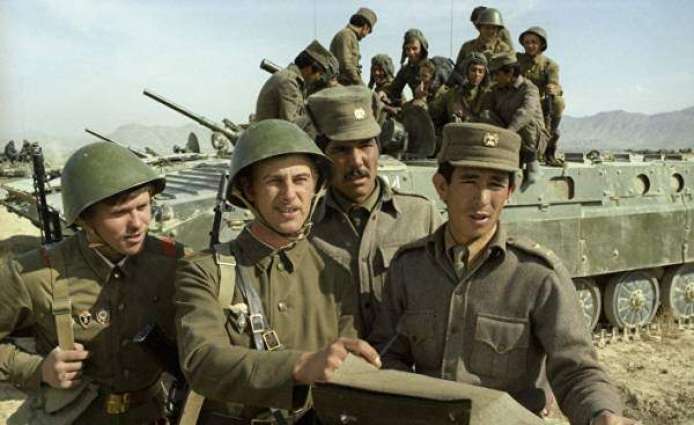The Soviet Union's military campaign in Afghanistan helped to hold back the ongoing crisis in the country for 10 or 15 years, Alexander Razumov, the chairman of the board of the Russian Union of Afghan War Veterans and deputy commander of an airborne battalion during the campaign, told Sputnik in an interview
MOSCOW (Pakistan Point News / Sputnik - 15th February, 2019) The Soviet Union's military campaign in Afghanistan helped to hold back the ongoing crisis in the country for 10 or 15 years, Alexander Razumov, the chairman of the board of the Russian Union of Afghan War Veterans and deputy commander of an airborne battalion during the campaign, told Sputnik in an interview.
The campaign in question is often qualified as a Cold War proxy conflict, during which the Soviet army was fighting US-backed militants in an attempt to ensure that the communist government stayed in power after the April 1978 coup. Soviet forces eventually left Afghanistan in early 1989, with the day of troop withdrawal commemorated on February 15.
"I do not believe that we made a mistake [by deploying troops to Afghanistan]. We rather made a mistake when we pulled out of there. As current developments have shown, we held back what is happening today for 10-15 years," Razumov said.
US FACING COMPLETELY DIFFERENT SITUATION
According to Razumov, once the Soviet troops left, the situation in Afghanistan got worse, since a "brutal civil war" broke out in the country, which continues to this day.
Afghanistan has been in a state of turmoil, with the government fighting the Taliban, which regularly launches offensives in the country's key big cities. The situation has been exacerbated by the activities of the Islamic State terror group (IS, outlawed in Russia), which has been operating in Afghanistan since 2015.
The United States and its allies launched a military operation in Afghanistan in 2001 after the September 11, 2001, terror attacks on New York City and Washington, DC. The mission in Afghanistan ended in 2014, but on January 1, 2015, NATO announced a new mission dubbed "Resolute Support" to train and assist the Afghan security forces in their fight against terrorism and militant insurgency, particularly the Taliban.
Some 14,000 US troops are currently deployed in Afghanistan in addition to 16,000 NATO military personnel serving in the country as part of the mission.
The war veteran noted that the United States and NATO had now been facing a completely different situation in Afghanistan, as the Soviet Union was at war with the Islamic guerrilla members, which received funds and weapons from across the world.
"At that time, almost all countries of the capitalist camp were against us. Almost the whole world helped the mujahideen [Afghan Islamic guerrilla fighters] with arms and money. We fought in Afghanistan against almost the whole world represented by the mujahideen. Nobody helps the Taliban now. The situation has changed," he argued.
Another difference is relations with the local civilian population, Razumov went on.
"In contrast to what is currently happening in Afghanistan, we had very close contacts with the civilian population, often helped [them]. We had normal relations with the civilian population � we did not plunder and did not rape anyone ... We used to go to the market and absolutely normally communicated with the population, and people communicated with us," he said, adding that Afghanistan is an "amazing multiethnic country."
Razumov added that he had been on visits to Afghanistan on frequent occasions, most recently last year, adding that the people felt hostility toward the US troops, with many regretting the 1989 Soviet withdrawal.
'REGIME ONLY BACKED BY BAYONETS WILL NOT LAST LONG'
The war veteran said that he felt no remorse about the past events, adding that the Soviet troops were carrying out their military duty and "completed it 100 percent."
He, however, noted that "it is abnormal when any country's troops are present in another country," adding that "the regime, which is supported [only] by bayonets, will not stand for long."
Looking back, the veteran therefore doubted that Islamic Afghanistan, which was an extremely feudal state at that moment, was anyhow ready for a socialist revolution.
Commenting on the prospects for US troop withdrawal from Afghanistan, Razumov expressed doubt that it would actually happen.
"Today, [President Donald] Trump, as a businessman, decided that it is beneficial. Tomorrow, he would refuse and claim that he had not said that. We have been witnessing this throughout his presidential term since bargaining is underway on all issues. They do not seem to be withdrawing troops because their bases are filled with ammunition, fuel and all other necessary things," he said.
He also suggested that if the United States did pull out troops, a more serious conflict might emerge, as the IS terror group would likely gain ground in the country.
In late January, Trump told reporters that he would withdraw troops from Afghanistan if a peace deal was reached with the Taliban. In his state of the union address earlier in February, he said that the United States would be able to reduce its troop presence in Afghanistan after constructive talks with various local groups, including the Taliban.




